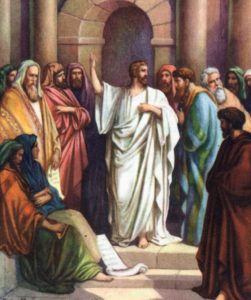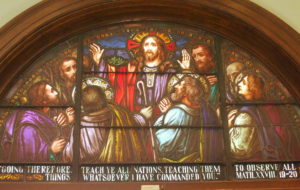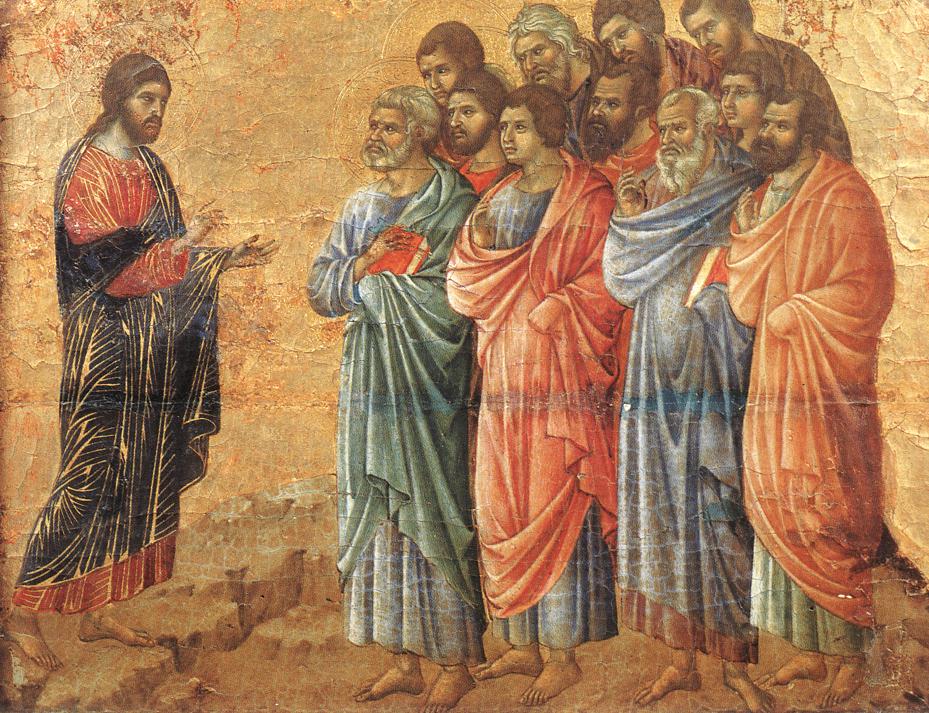The New Testament gospel writers had many purposes in their writing, but at the end of their accounts, they all had a common theme. What was the great purpose of the people of God now that Jesus had returned to his place at the right hand of the Father? The last command that Jesus gave is generally referred to as the great commission and is considered by the church as a whole as the controlling theme and guide for all that the people of God are to be about.
“And Jesus came and said to them, ‘All authority in heaven and earth has been given to me. Go therefore and make disciples of all nations, baptizing them in the name of the Father and of the Son and of the Holy Spirit, teaching them to observe all that I have commanded you. And behold, I am with you always, to the end of the age’ (Matthew 28:18-20).”
“And he said to them, ‘Go into all the world and proclaim the gospel to the whole creation’ (Mark 16:15).”
 While both Luke and John are not as explicit, they do make clear that Jesus has prepared his followers to be about spreading the gospel message and that he is sending his Holy Spirit to enable them to be about the task. Luke’s Acts of the Apostles is a historical description of how the early church carried the message of new life in Christ from Jerusalem to the ends of the known earth at the time. These early followers of Jesus understood the central place of the great commission in the life of the church and they set about carrying out his last great command to his people.
While both Luke and John are not as explicit, they do make clear that Jesus has prepared his followers to be about spreading the gospel message and that he is sending his Holy Spirit to enable them to be about the task. Luke’s Acts of the Apostles is a historical description of how the early church carried the message of new life in Christ from Jerusalem to the ends of the known earth at the time. These early followers of Jesus understood the central place of the great commission in the life of the church and they set about carrying out his last great command to his people.
Mark, as was his custom, provided a succinct summary of the content of Jesus’ final commission to his followers. He spoke to those who had faithfully followed him and had committed their lives to be willing slaves at his command. The great commission is not given to those who are unsure of their commitment, but to those who have turned away from all other demands of life in order to focus on Jesus as the ultimate source of guidance in their lives. For an individual or a church to carry out the great commission, there must first be a determination that following Jesus is the very center and core of life. This commission must be understood in light of the challenge Jesus gave to his disciples regarding his identity and their commitment to him in that light. John recounted a time when Jesus began to challenge his followers to a deeper commitment and many chose in response to walking away.
“After this many of his disciples turned back and no longer walked with him. So Jesus said to the Twelve, ‘Do you want to go away as well? Simon Peter answered him, ‘Lord, to whom shall we go? You have the words of eternal life, and we have believed, and have come to know, that you are the Holy One of God’ (John 6:66-69).”
The great commission can only be carried out by followers who have no other options but to hear the words of Jesus and act on them.
Peter declared that only in Jesus are the words that lead to life; that there are no other options. Until an individual and a church as a whole have made such a commitment, the great commission will not be seen as a priority. But once such an all-in commitment has been made, the great commission will stand apart as the guiding principle for every choice in life. Following fully after Jesus involves knowing him and knowing his heart and this will result in carrying out his priorities. The act of going will naturally follow in the lives of those who have come to know Jesus fully and have chosen to make his direction complete in every area of life.
The ability to carry out the great commission is rooted in the authority that Jesus has been given and which he has designated to those who have put their faith in him. The people of God are able to go out into the world and take back territory from the enemies of God because of this authority and the power that goes along with it. Luke’s version of the great commission is less overt because he included the necessity of waiting for the power that will enable the church to fulfill this commission as the people of God are clothed with power from on high. It is those who have been filled with the power of the Holy Spirit that will have the tools necessary to take the gospel message to the ends of the earth and challenge the demonic powers that have so many in their hold.
“You are witnesses of these things. And behold, I am sending the promise of my Father upon you. But stay in the city until you are clothed with power from on high (Luke 24:48-49).”
Luke’s account not only affirmed the great commission but also included a command to wait in the city until God acted to make them capable of completing the task. The choice to wait for involved faith that God would provide the necessary power to enable his people to speak with boldness regarding who Jesus is and of his call to all people to repent and believe in him. The Acts of the Apostles is a record of how God’s people stood fearlessly against the powers set against them and faithfully carried out the great commission.
“And they were all filled with the Holy Spirit and began to speak in other tongues as the Spirit gave them utterance (Acts 2:4).”
 The filling of the Holy Spirit is for all because all are expected to be witnesses and be about carrying out the great commission. This final command of Jesus is not for a few, but for all who wait upon him and allow him to fill them with his Spirit. The ability to faithfully declare the gospel in every place and in every situation is not a matter of personal ability, but of the power of God filling a person up as he or she chooses to hear the voice of the Lord and be a fully committed follower of Jesus. The willingness to follow Jesus wherever he would lead and to do whatever is required will put a person in situations to faithfully witness of Jesus in the power of the Holy Spirit. The great commission is thus a natural outflow of a commitment to be a follower of Jesus and a willingness to allow the Spirit of God to take over every part of a person’s life.
The filling of the Holy Spirit is for all because all are expected to be witnesses and be about carrying out the great commission. This final command of Jesus is not for a few, but for all who wait upon him and allow him to fill them with his Spirit. The ability to faithfully declare the gospel in every place and in every situation is not a matter of personal ability, but of the power of God filling a person up as he or she chooses to hear the voice of the Lord and be a fully committed follower of Jesus. The willingness to follow Jesus wherever he would lead and to do whatever is required will put a person in situations to faithfully witness of Jesus in the power of the Holy Spirit. The great commission is thus a natural outflow of a commitment to be a follower of Jesus and a willingness to allow the Spirit of God to take over every part of a person’s life.
Matthew’s version of the great commission includes the process by which the great commission would continue to be carried out through future generations. Those who respond to the declaration of the gospel with faith are to be baptized, a public declaration of being dead to an old life of sin and to being a new creature in Christ, and taught the truths of the gospel that are necessary to live out the Christian life and to be a witness of Jesus to others. In this process, Jesus promises his presence as his followers carry out his commandment to take the gospel to the ends of the earth. Those who carry out the great commission are not promised an easy life, often it is a very difficult one, but they are promised the presence of their Lord wherever they go.
The great commission is the central command for the individual follower of Jesus and for the church as a whole.
The guiding principle of God’s people is to take the gospel message throughout the earth and to be about developing others who can then take up the gospel to others. Carrying out the great commission is for those who have committed to Jesus as the Lord over their lives and thus all that they do is about hearing his voice and carrying out his direction. The gospel message has power as the people of God wait on the Lord and allow themselves to be filled with the power of the Spirit. The presence of Jesus is promised to all who are about carrying out the great commission and he will be with them through whatever challenges they may face. God’s purposes on the earth are carried out by those committed to the great commission and who faithfully carry it out to the ends of the earth.






